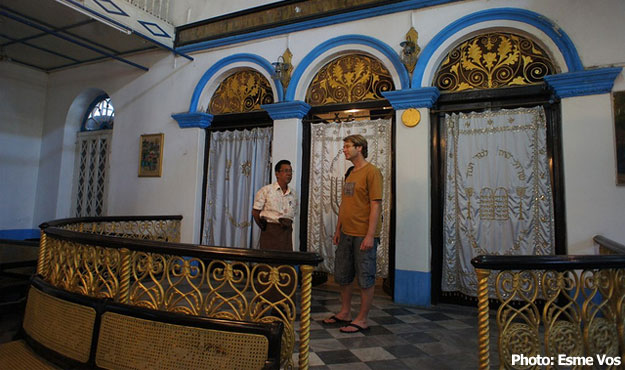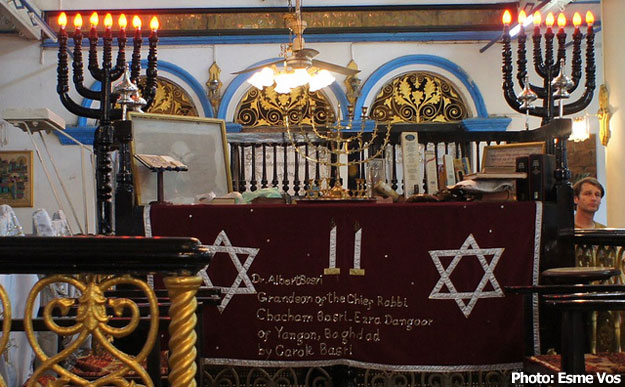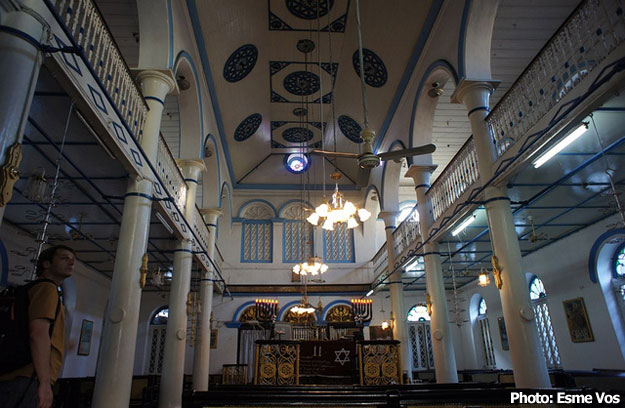(Feature) – Moses Samuels dreams about the “Golden Age” for Jews in Burma. Like most Jews everywhere, Samuels spends an inordinate amount of time worrying about the future.
(Feature) – Moses Samuels dreams about the “Golden Age” for Jews in Burma.
Like most Jews everywhere, Samuels spends an inordinate amount of time worrying about the future.
Standing in the high-ceilinged Musmeah Yushua synagogue, the caretaker harks back to the time when a thriving Jewish community lived in Rangoon and hopes, against the odds, that the community will revive.
 Like Martin Luther King, Samuels has a dream. His hope is that the Jewish community of Burma will reverse its declining population and become functional again. Currently, there are just 45 Jews in the congregation. “We rarely have a minyan,” Samuels says, referring to the 10 men needed for public prayer on the Sabbath.
Like Martin Luther King, Samuels has a dream. His hope is that the Jewish community of Burma will reverse its declining population and become functional again. Currently, there are just 45 Jews in the congregation. “We rarely have a minyan,” Samuels says, referring to the 10 men needed for public prayer on the Sabbath.
Away from the bustle of the vendors on the street outside, the synagogue, built in 1896, is a quiet sanctuary.
The Jewish community has had no rabbi since 1969, no kosher food (but halal Muslim food is a close replacement) and, since no one in the congregation speaks or reads Hebrew, the Torah only gets chanted when officials from the Israeli Embassy in Rangoon participate in Sabbath prayers.
Facing these odds, one might accuse Samuels of being guilty of the kind of faith Boswell cynically observed was “the triumph of hope over experience.”
Sometimes even the optimistic Samuels fears that his beloved synagogue and Jewish community might become nothing more than a cultural curiosity, as has become the case with the Jewish community in Cochin in neighbouring India.

Beginning in the mid-19th century, Sephardic Jewish Iraqis, who traded in teak, rice, coffee, jade and gold, were encouraged by the British colonial authorities to settle in Burma. Shortly after the Jews migrated to Burma, their influence within the government and society grew rapidly. The Jewish influence in Burma was so influential, in fact, that, in the turn of the 20th century, the mayor of the capital Rangoon and Bassein was Jewish. And some of the major streets and roads in Rangoon were named after important Jews, according to Jewish sources.
The Jewish community grew and at its peak numbered some 2,500 people.
But most of the Burmese Jews fled the Japanese invasion during World War II, while those few who remained sought greener pastures when Burma’s military government took power under General Ne Win in 1962. Of the few who were left, the nationalization of businesses in 1969 led to another, smaller, exodus, according to Jewish sources.
Samuels, who was born and bred in Burma, hopes that his children will be a part of the solution. The only single Jews for these young people to marry are relatives, Samuels explains, so he plans to send his daughter Diana, 21, and later his other daughter, Kazna, 19, and his son Sammy, 16, to live with relatives in Israel, Britain or the United States. There he hopes they will get married and start families. And then, he hopes, they will return.

Help might also come if the country continues to open up to foreign investment. Western sanctions are biting at the moment but in time, with improvements in government, foreign investors may take an interest. The logic is that with a more open business environment some of the émigré Jews might be willing to come back. Although human rights activists urge against foreign investment in Burma, development continues at an aggressive pace, as witnessed by the 18 foreign hotels under construction in the capital.
But for the moment, Samuels, thin and serious and dressed in a Burmese longyi sarong and a short-sleeved batik shirt, relies on the kindness of strangers. Visiting Jews drop a few dollars into the collection box, and richer philanthropists have helped to refurbish the white-tiled sanctuary where the torahs are kept.
Of more immediate concern to Samuels, who inherited the role of caretaker from his father Isaac, who died in 1978, is the possibility that the government will raze the Jewish cemetery, where about 700 people are buried. Like neighbouring Chinese, Bahai’i, Muslim, Parsi, and Armenian cemeteries, the palm-tree lined Jewish graveyard lies on prime commercial land in the centre of rapidly expanding Rangoon. The government owns the cemetery land, as it does the land on which the synagogue stands.
As with the recent bulldozing of a 100-year-old Muslim cemetery in Meiktila, nothing is sacred when it comes to the quest for land.
There is much for Moses Samuels to be worried about.



